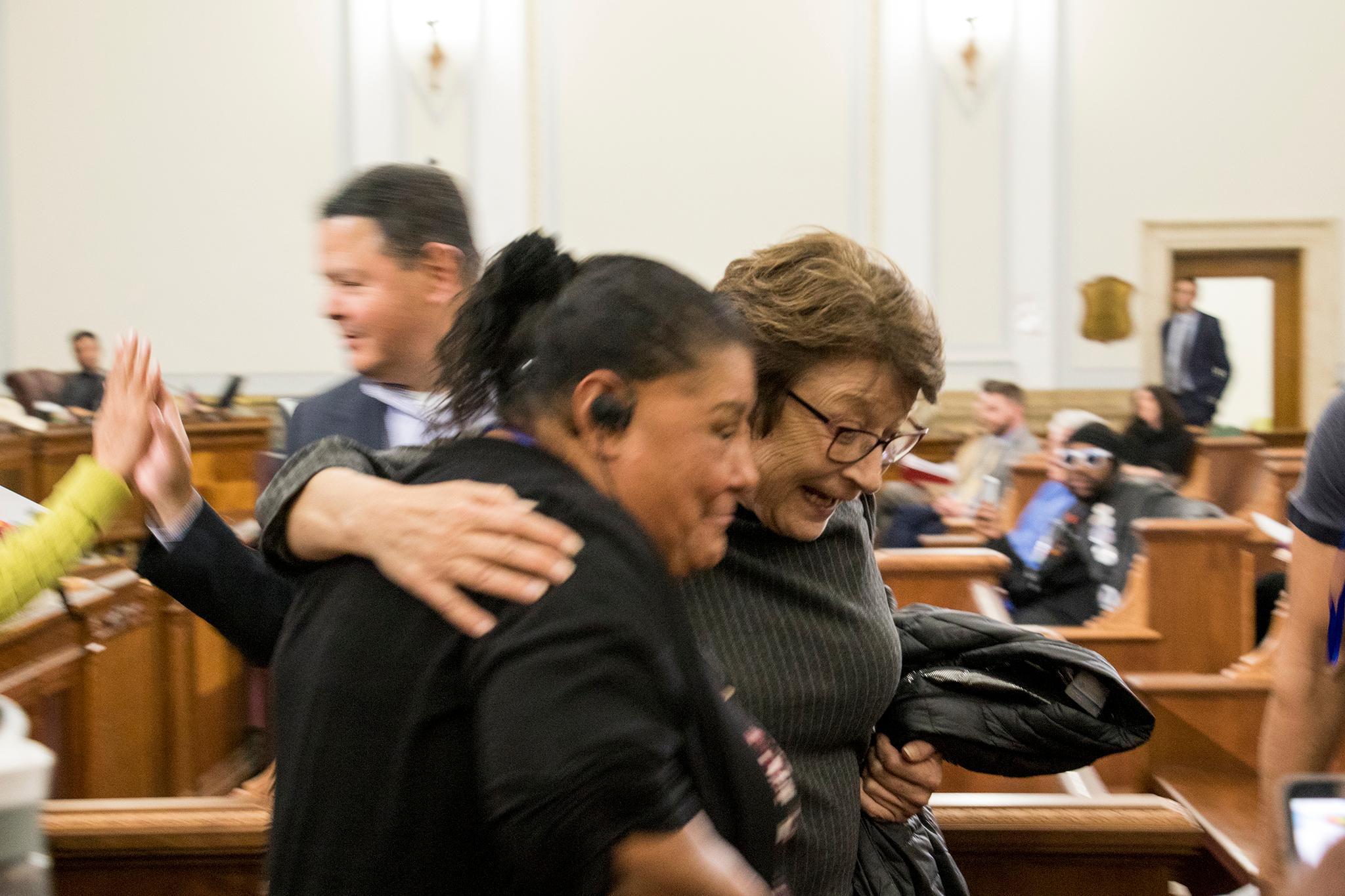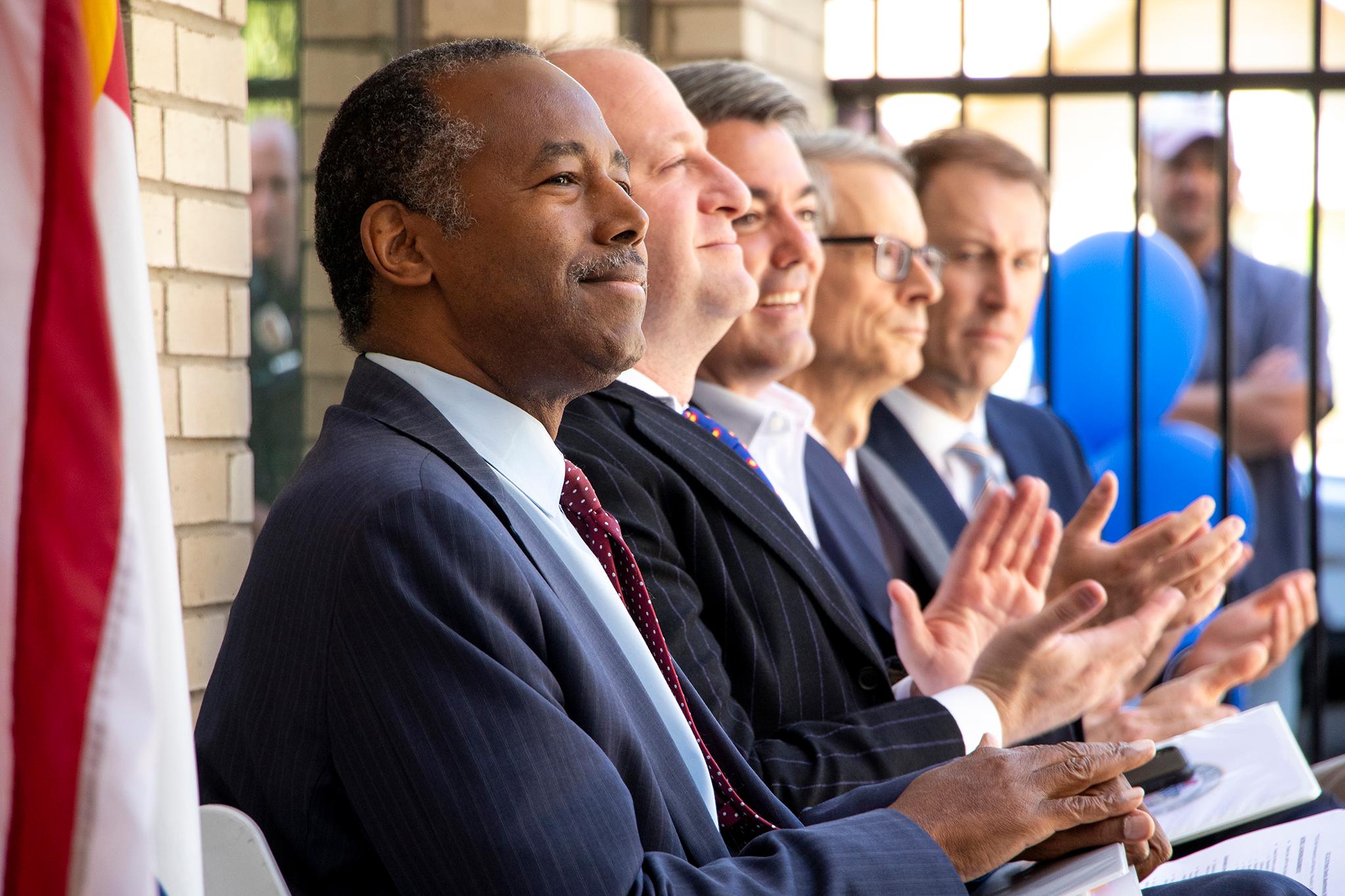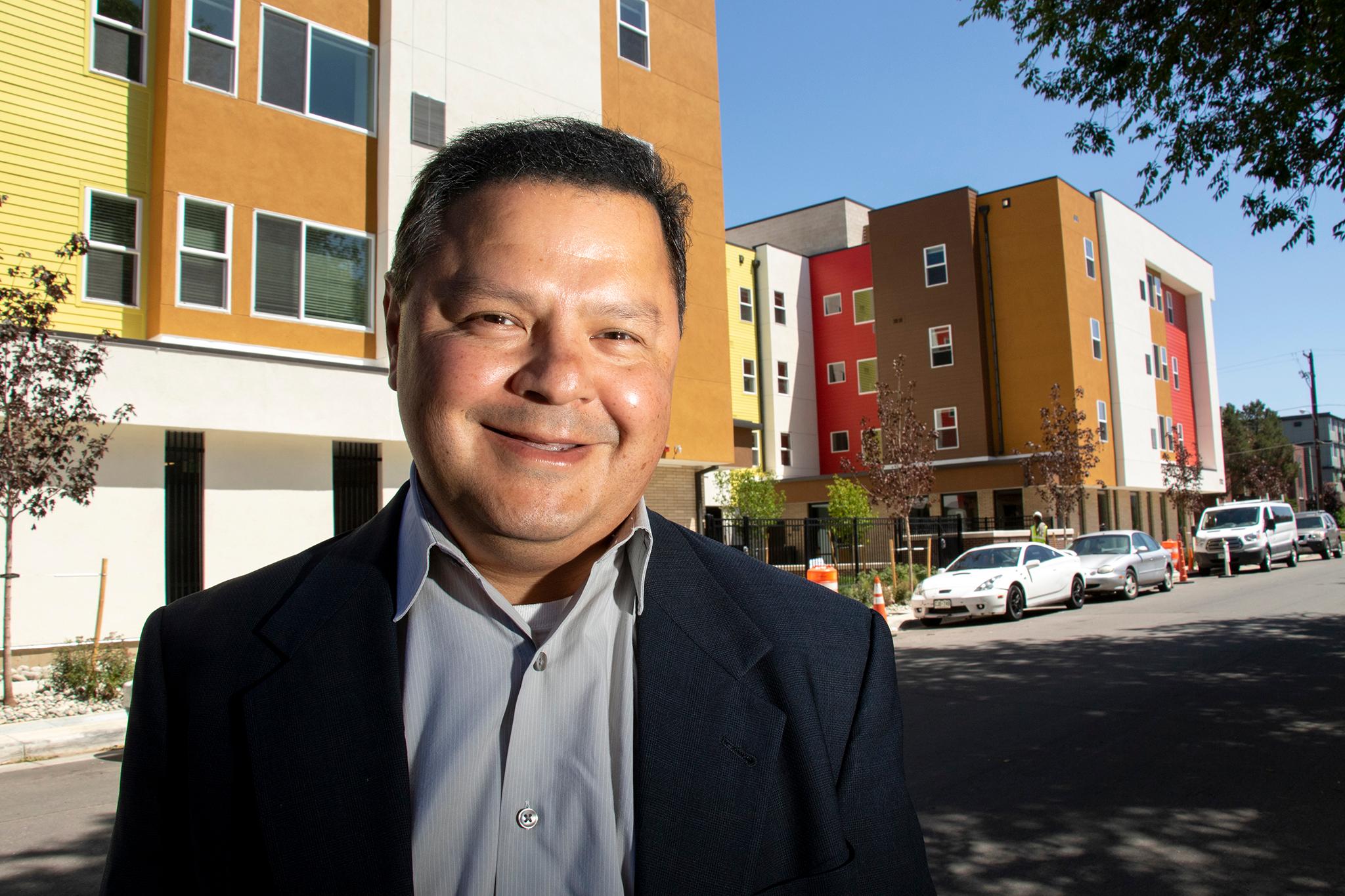If it's about housing and helping communities, Jeff Martinez can be counted on to listen.
Martinez, president of Brothers Redevelopment Inc., heard her out when Jane Harrington called with a proposal. The executive director of Colorado Community Land Trust wanted him to collaborate on a project in Globeville and Elyria-Swansea.
The land trust model, in which the costs of buying a home are kept relatively low because the dirt under the houses is held communally, was new to Martinez. But he saw something familiar when he followed up the phone call with a visit to the area where three houses Harrington hoped to place into a trust were located.
"Those working-class neighborhoods, they need some help," Martinez said. "It's what we do."
Brothers became the developer for a Globeville and Elyria-Swansea community group, GES Coalition, that had for several years been working with Harrington's Colorado Community Land trust to find a way for low-income families to stay in a part of Denver that was seeing the rising rents and property taxes of gentrification that force dislocation. Brothers bought the three houses. Two are to be torn down and replaced with duplexes and the third renovated, creating the first five homes expected to be sold to families and brought into a Globeville-Elyria-Swansea land trust later this year.
Working together as the GES Affordable Housing Collaborative, the GES Coalition, Colorado Community Land Trust and Brothers secured a $2 million grant last year from the Colorado Department of Transportation, which has sought to mitigate some of the displacement and disruption caused by its Interstate 70 expansion and renovation project. Earlier this year Mayor Michael Hancock promised another $2 million. Such grants allow costs to home buyers to be cut further and support training and financial help to ensure the trust's viability.
"Brothers investing in the neighborhood and buying those homes was a real turning point," Harrington said.

Martinez said the Globeville-Elyria-Swansea "community has a vision for itself. And we can play a role in that, just given our roots and our background."
Brothers started in the 1970s as a grassroots effort led by Joe Giron, Rev. Richard Magnus, Manny Martinez and Don Schierling to repair and spruce up homes in low-income neighborhoods. Giron knew the owner of a public relations firm where Martinez, whose background is in communications, was working in 2000. That was when Martinez first got to know Brothers, which needed help organizing and publicizing a celebration for its then upcoming 30th anniversary.
Martinez was inspired by Giron and Mary Ann Shing, who had risen from an administrative assistant at Brothers to its executive director and later president.
"They just had that passion," Martinez said. "They were fun."
After the celebration, Martinez kept in touch with Giron and Shing, occasionally helping them with public relations as a volunteer even after he moved from the private firm to government communications. Martinez worked for the city of Aurora, where he had been raised. It was a period of change for the Denver suburb, with the opportunity for new development at sites like the Fitzsimons Army hospital.
"I got a little bit of a taste for" development then, Martinez said. He smiled and added: "I didn't understand it."
He came to Brothers in 2007 as director of communications and community relations. He was named vice president in 2010. When Shing retired, he took over as president in 2013. Martinez had told Shing: "I think I can do it because I get Brothers."
Giron, who was vice president and later president of Brothers for more than two decades before retiring in 2004, was 83 when he died in a car accident last year. He remains a lodestone.
"He just had that heart to serve," Martinez said. "Brothers was kind of an organization where you said, 'Just show up and serve.'
"You just show up with a paintbrush and a tool kit and get to work."
Brothers still does the kind of work people who knew it in the early days would recognize. The company is perhaps best known for its Paint-A-Thons, in which volunteers are organized into crews to paint the exteriors of the homes of low- and moderate-income seniors. A paint job or the more extensive repairs and modifications Brothers also performs can help extend the life of a house, and thereby the tenancy of its residents.
Brothers, with a staff of about 70, also recruits landlords to help secure housing for people receiving rental assistance who are recovering from health problems or leaving rehabilitation services. Its other programs include managing properties owned by other affordable housing companies, connecting people to the city of Denver's emergency rental assistance program and counseling homeowners in danger of falling behind on their mortgages and seniors who need help applying for social security, medical and other benefits.
If the link between medical benefits and housing isn't quite clear, ask Gwen Turner.
The retired operating room and then dialysis technician will be 80 years old in October. Turner has had two knee operations. A stroke has damaged her peripheral vision. Two years ago, she sold her condo in Green Valley Ranch and moved to an apartment in North Park Hill to simplify her life and cut down on expenses.
"I've been an independent person all my life," said Turner, the eldest of seven siblings who said she grew up not only taking care of herself but of her brothers and sisters. Later, she helped raise a nephew and looked after her elderly mother.
The cost of her medications was putting a strain on Turner's budget. She learned about Brothers at a community meeting held to connect seniors with services. A Brothers navigator helped her register for the benefits she needed, ensuring she would not have to choose between paying the rent or for medicine as she settled into her new home.
Rene Quihuiz, the senior services coordinator at Brothers, "made the transition much more smooth," Turner said, adding Quihuiz calls every so often to make sure she is doing well.
Several Brothers housing complexes are for senior or disabled tenants, often people on fixed incomes who are struggling as metro Denver's cost of living has increased. Quihuiz offered to help her if she wanted to move to housing designed for older tenants, instead of the multi-generational apartment building that she found on her own.
"I said, 'No, I can take care of myself,'" Turner said. "For as long as I can, I want to."
Turner is making plans to plant tomatoes in pots on her fourth-floor balcony. She uses the bicycle in her complex's gym, takes walks around the buildings and enjoys chatting with the other tenants. It amuses her that many think she's decades younger than she is.
It's clear seniors have a special place at Brothers. The company headquarters is on the ground floor of Edgewater Plaza, which has 84 federally subsidized apartments for seniors.
"We're holding the roof up," Martinez said. "We're holding the roof up for people who need it."
Edgewater, blocks from Sloan Lake, was Brothers's first housing project, developed in the 1980s on the site of an old high school. The gym was preserved and tenants and Brothers's staff share its exercise machines and gathering spaces.
When Martinez is considering taking on a new challenge, part of the key is whether "it's one step away, it's not five steps away" from the kind of work Brothers is already doing.
"It still has to be thoughtful. We still have to be very methodical about how we take on new services."
In practice, the Colorado Community Land Trust's Harrington said, that translates to not over-promising and keeping the promises Brothers does make.
Martinez said he doesn't want to stretch so far that his nonprofit loses sight of its mission. But he wants to grow.
"We're just committed to helping whenever we get asked," he said. "We don't always know where that may lead."
He has found that when Brothers does something new, "it takes us to some bigger opportunities."
"My head spins some days," Martinez said, though it's hard to believe because he is so soft-spoken and calm.
"I'd rather be doing that than the alternative, where I'm sitting there and nothing's going on. You can't say you want to serve and just sit on your hands."
In July, Brothers celebrated the grand opening of a $13.5 million, 39-unit complex in Aurora, the Paris Family Apartments. Tenants of the two- and three-bedroom units will include veterans and families who need employment training, connections to jobs and mentoring to stay housed. Brothers is working with the Mental Health Center of Aurora and others to provide the support.
At the beginning of the Paris project, the concept of permanent supportive housing was new to Martinez. He worked with the city of Aurora, Arapahoe County, the Colorado Division of Housing and the federal Housing and Urban Development department to secure funding for Paris. He also had to grapple with the complex, competitive and, for him, unfamiliar process of applying for low-income housing tax credits from the Colorado Housing and Finance Authority. Developers who are awarded tax credits sell them to investors for cash they then use to build.
It was five years between his first discussions with Aurora officials and July's ribbon-cutting at 1702 Paris St. HUD Secretary Ben Carson, Gov. Jared Polis and U.S. Sen. Cory Gardner were among those celebrating with Martinez.

Over the years that it can take to build a below-market-rate complex, funders will find other projects, partners will change, new political leaders will arrive with different priorities, Martinez said. Brothers persevered. In the end, the Paris Family Apartments experience opened "our horizons to kind of being a more active affordable housing developer," Martinez said.
Denver Economic Development & Opportunity announced in June that two developers had been awarded contracts to bring affordable housing to East Colfax. One was Mercy Housing, one of the biggest nonprofit affordable housing developers in the country with more than 300 residential complexes across the United States. The other was Brothers, which has 14 complexes including Paris, most in metro Denver.
Mercy plans a building on East Colfax with a preschool as well as about 80 apartments that will be affordable for households earning no more than 80 percent of the area median income. Down the street, Brothers proposes homes for 72 families who have experienced homelessness. Brothers will work with the Brain Injury Alliance of Colorado to provide services at the site to tenants. In developing the Colfax project, Martinez has learned that brain injuries can put people at risk for homelessness by making it difficult to thrive at school or work and leading to lifelong physical and cognitive disabilities.
Brothers will offer some of its own support programs out of an office at 7900 E. Colfax Ave. to help families who may face displacement in a neighborhood that, like Globeville-Elyria-Swansea, is seeing signs of gentrification.
Brothers is a "locally grown organization, responsive to neighborhood needs and community needs," said Britta Fisher, chief housing officer for Denver Economic Development & Opportunity.
Fisher said she has been familiar with Brothers since long before she joined the city last year. She has worked for housing and economic development nonprofits and served on the state Housing Board. Brothers is a company, she said, that does what it says it's going to do.
In recent years, as Brothers has been doing more, more funding sources have appeared.
In 2016, Denver's City Council approved an Affordable Housing Fund proposed by Mayor Michael Hancock. Last year, at Hancock's suggestion, the council raised taxes on retail marijuana and directed that other money from the general fund be used to double the goals of the housing fund from initial plans to support the building of 3,000 below-market units over several years to 6,200 units.
Last year state lawmakers voted to double the annual aggregate cap from $5 million to $10 million that the Colorado Housing and Finance Authority can distribute in state low-income housing tax credits beginning next year through 2024. Lawmakers also agreed to funnel up to $30 million from fiscal year 2020-21 through 2022-23 from the treasurer's unclaimed property trust fund to the Housing Development Grant Fund, to which developers can apply on a competitive basis for money to acquire, rehabilitate and construct affordable housing projects. Another state legislative measure capped the amount of sale tax money retailers can keep to cover administrative costs, bringing in about $23 million this fiscal year and about $48 million in the next for the Housing Development Grant Fund.
"We have to be encouraged. I think the public sector and local governments have stepped up and acknowledged that we are in an affordable housing crisis for many," Martinez said.
But it's not enough, he said. As land, construction and other costs ballooned, Martinez has had to add more and more layers of philanthropic, private equity and public funding to ensure low- and moderate-income families can afford to live in Brothers developments.
"Real estate development is extraordinarily expensive, particularly in this market," Martinez said. "You always need a lot of funding sources. Especially in affordable, because we're trying to keep rents down."
He hopes for continued efforts to find more funding, particularly for large projects.
"We have people show up at the front desk here," Martinez said as he sat in a glass-walled conference room at his offices off Sloan Lake. "A lot of folks are one (personal) crisis away from being in a real difficult situation."
It's not just funders, he said.
"We should be doing more," he said. "We're not doing enough."














